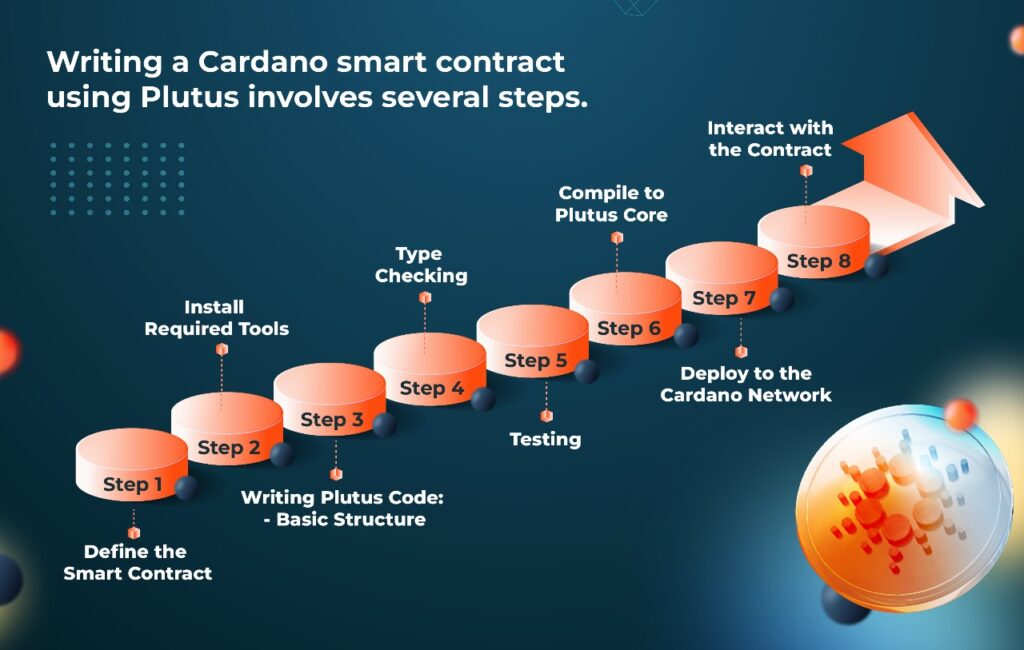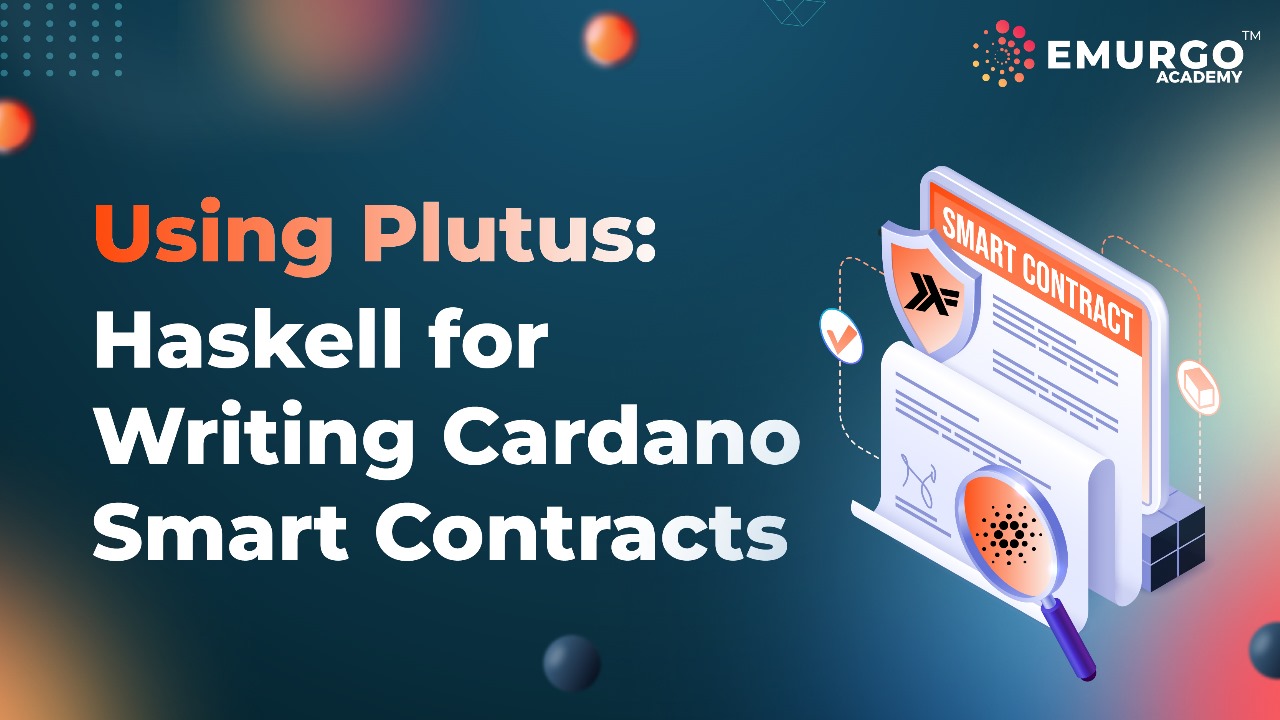Introduction about Cardano Smart Contracts
The world of blockchain technology has been evolving rapidly, and Cardano has emerged as a frontrunner in the race for innovation and functionality. One of the pivotal moments in Cardano’s journey was the Alonzo Hard Fork, which ushered in smart contract capabilities on the Cardano mainnet. This development allowed developers to create and deploy smart contracts on Cardano using a powerful and unique programming language called Haskell. In this blog, we will explore the world of smart contracts on Cardano, delve into the Haskell programming language, and understand why Cardano’s approach stands out in the blockchain landscape.
Smart Contracts: A Primer
Smart contracts are “self-executing” digital agreements that operate without intermediaries, ensuring transparency and trust in various transactions. These contracts are designed to automate processes, enabling the seamless transfer of assets or the execution of predefined actions when specific conditions are met.
Cardano’s smart contracts represent a groundbreaking development in blockchain technology, offering a secure and scalable platform for decentralized applications (DApps). One of the key distinctions in Cardano’s smart contract design lies in its approach to on-chain validators versus off-chain transaction building components. On-chain validators are the core elements responsible for executing and validating smart contracts directly on the blockchain. This design choice enhances security and transparency as the contract logic is executed within the blockchain’s decentralized network. In contrast, off-chain transaction building components enable users to create and interact with smart contracts off the blockchain, optimizing efficiency and scalability. This dual-layer approach strikes a balance between security and performance, ensuring that Cardano remains a versatile platform for DApps while maintaining the robustness of on-chain execution. It exemplifies Cardano’s commitment to providing a secure and flexible ecosystem for smart contract development.
Programming Languages for Cardano Smart Contracts
Cardano offers developers three distinct languages for smart contract development:
- Marlowe: Marlowe is a domain-specific language (DSL) tailored for creating blockchain applications focused on financial transactions. It offers enhanced security, assured certainty, and guarantees of termination. Marlowe is designed for creating financial smart contracts and enforces strict rules, ensuring contracts have defined durations, set lengths of time to be effective, and no assets are retained upon closure.
- Plutus: Plutus is Cardano’s primary smart contract platform. It allows developers to write smart contracts in Haskell, providing a powerful and predictable environment. Plutus simplifies the development of secure apps, token creation, and smart contract construction. One key advantage is that developers can write and test their code without the need for a complete Cardano node.The conversion from Plutus to Plutus Core is a critical process in Cardano’s smart contract development. Initially, developers write their contracts in Plutus, a user-friendly language. After passing type checking, the code is compiled into Plutus Core, a lower-level language that the Cardano blockchain can execute. Plutus Core code is deployed to the blockchain, where it consumes gas based on complexity. This conversion ensures that high-level contract logic is transformed into a machine-readable format, allowing for secure and efficient execution while maintaining Cardano’s blockchain integrity and security.
- Haskell: Haskell is the foundational language underlying Plutus and Marlowe. It is a purely functional programming language renowned for its high-assurance code capabilities. Haskell ensures robust and correct code implementation, making it the language of choice for Cardano’s smart contracts.
Creating Cardano Smart Contracts

Developing smart contracts on Cardano involves a structured process with eight distinct steps:
Writing a Cardano smart contract using Plutus involves several steps. Here’s a step-by-step description of the process:
1. Define the Smart Contract: Begin by outlining the purpose and functionality of your smart contract. Determine what kind of assets or operations it will manage, and identify the conditions or rules it should enforce.
2. Install Required Tools: Ensure you have the necessary development tools installed for writing and compiling plutus applications
3. Writing Plutus Code:
– Basic Structure: Start by creating a basic structure for your contract. This includes importing necessary modules and defining the contract’s data types.
– Contract Logic: Write the logic of your smart contract in Plutus. Define functions and data structures that specify how the contract behaves, handles assets, and enforces rules.
4. Type Checking: Use the development tools to check your code for type errors. Plutus has a strong type system that helps catch potential issues early.
5. Testing: Write test cases to ensure your smart contract functions as expected. You can simulate various scenarios to validate the contract’s behavior.
6. Compile to Plutus Core: Once your Plutus code is error-free and tested, it needs to be compiled into Plutus Core, which is the language the Cardano blockchain understands. This compilation process is typically handled by development tools.
7. Deploy to the Cardano Network: Deploy your compiled Plutus Core code to the Cardano network. This usually involves creating a transaction that includes the contract’s code and any initial funds or parameters it needs.
8. Interact with the Contract: Users can now interact with your smart contract on the Cardano blockchain. This may involve making transactions, invoking contract functions, and interacting with its state.
Throughout the process, it’s important to document your code, follow best practices for security and efficiency, and consider the potential impact of your smart contract on the Cardano network’s scalability and resource usage. Additionally, staying informed about updates and changes to the Cardano ecosystem is crucial for maintaining a well-functioning smart contract.
What Sets Cardano Apart?
Cardano distinguishes itself from other blockchain platforms through several key features:
- Peer-Reviewed Research: Cardano’s development is grounded in peer-reviewed research, ensuring the highest levels of engineering and security.
- Haskell Language: Haskell’s robustness and correctness make it the preferred language for Cardano smart contracts, enhancing security and trustworthiness.
- Rich Type System: Haskell’s static typing catches errors at compile time, enhancing code quality and reliability.
Use Cases of Cardano Blockchain
Cardano’s smart contract capabilities open up a world of possibilities, including:
- NFT Marketplaces: Developers can build NFT marketplaces on Cardano with high security and efficiency, tapping into the growing NFT trend.
- DeFi Applications: Cardano’s unique architecture can make DeFi applications such as DEXs, Stablecoins, Lending protocols, Synthetics much more effective and efficient dApp Development
- Cardano supports decentralized applications (dApps) in various categories, from DeFi to gaming, offering robust and user-friendly solutions.
The Birth of Aiken: Simplifying Smart Contract Development
Aiken is a novel programming language designed to simplify and enhance smart contract development on Cardano. It boasts an easy-to-learn syntax, integration with other tools and languages, and state-of-the-art features. Aiken aims to bridge the gap between complex programming languages and developer-friendly platforms like Rust and Elm, offering a seamless development experience. While Aiken is awesome, we might need to wait for some time to see large-scale adoption of this new and revolutionary language and framework.
Conclusion
Cardano’s Alonzo Hard Fork has unlocked the potential for smart contract development on its blockchain, and Plutus, with its foundation in Haskell, is at the forefront of this revolution. Haskell’s high-assurance code capabilities and Cardano’s commitment to peer-reviewed research make it a trusted choice for developers. With Aiken’s emergence, the Cardano ecosystem is becoming even more developer-friendly, paving the way for innovative and secure smart contracts. The future of Cardano and smart contract development looks promising, and as the ecosystem continues to evolve, it will likely attract more developers seeking a robust and reliable platform for their projects.

